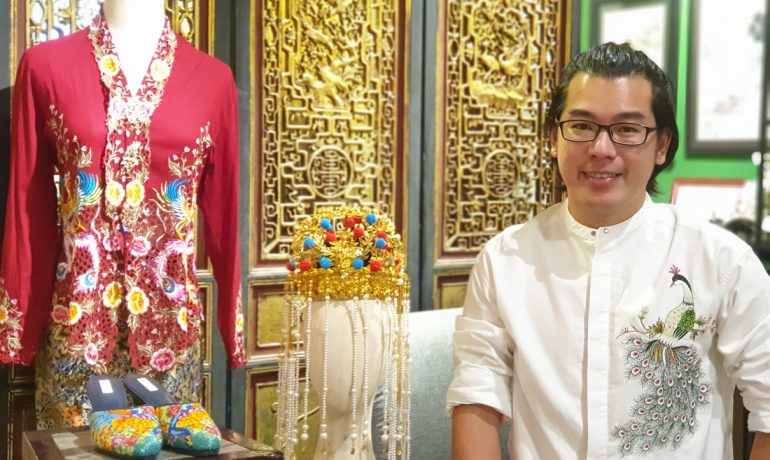With a burden to preserve his heritage, Kenny Loh dedicates his time to making and promoting kebayas and beaded shoes, keeping the art alive.
By Kelvyn Yeang
When people talk about Penang, food, culture, and the arts usually take center stage. With a rich history as a strategic trading port for the British Empire’s Straits Settlements, it is no wonder that Penang evolved into a cultural melting pot. Boasting culinary delights birthed from a fusion of varied ethnic origins to illustrious colloquialism, Penang does have it all. There is however one culture that is endemically unique to Penang—the Baba Nyonya.
What distinguished the regular migrant Chinese and the Baba Nyonya is that the latter chose to marry local customs, languages, and culture with their own to become the lifestyle and fashion revolution of the times. Out of this came the kebaya dress and beaded shoes, both famously celebrated for being extremely detailed in craftsmanship and highly difficult to produce. Today, the craftsmen and artisans responsible for this breathtaking attire have become a rarity. Modernisation has forced many people into pragmatism, and abandoning a decorated lifestyle for simplicity has seen a decline in the popularity of traditional clothing. But one individual from Penang is adamant in preserving the art.
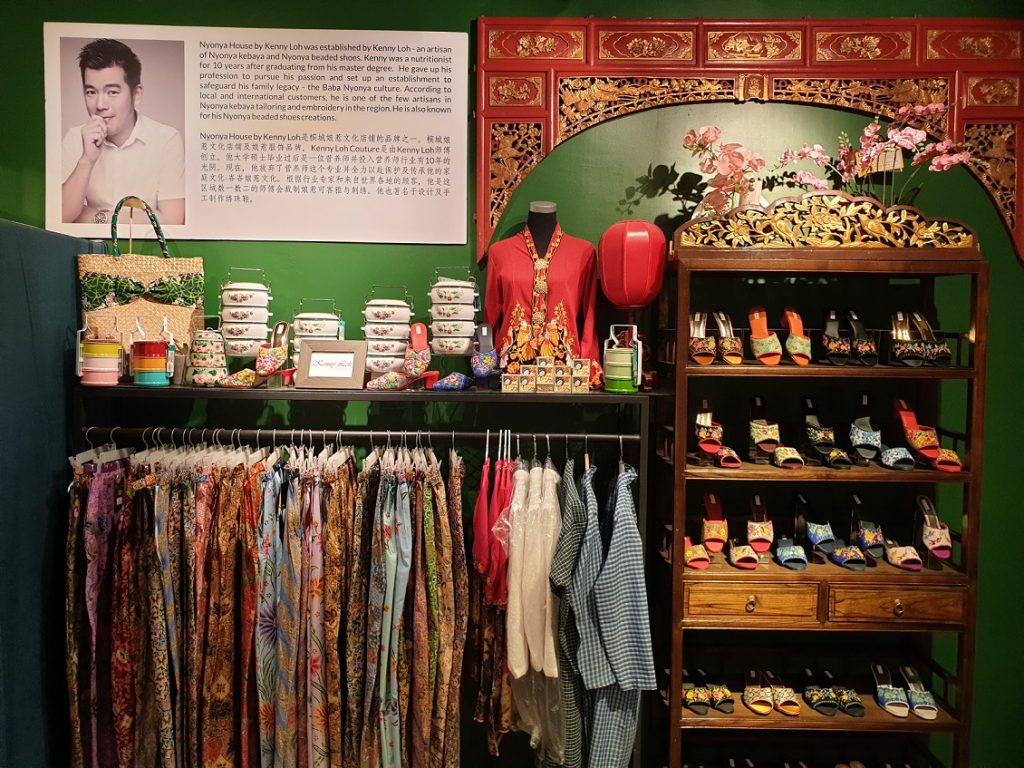
Photo courtesy of Kenny Loh
Kenny Loh is a man with a calling. After spending over a decade working as a nutritionist, he felt a huge burden to preserve the legacy of the Baba Nyonya. “This is part of our history. The Kebaya is so much a part of Penang and since very few people are continuing this art, I felt responsible to do something about it,” he remarks. Kenny always had a special place in his heart for the Baba Nyonya culture. Driven by interest and passion, he made it his goal to master the craft of kebaya and beaded shoemaking to bring it to the masses once more. After dedicating four years to learn the craft from various masters and artisans, he spent another two perfecting his skills before he was confident enough to market his product under his own brand—Kenny Loh Couture.
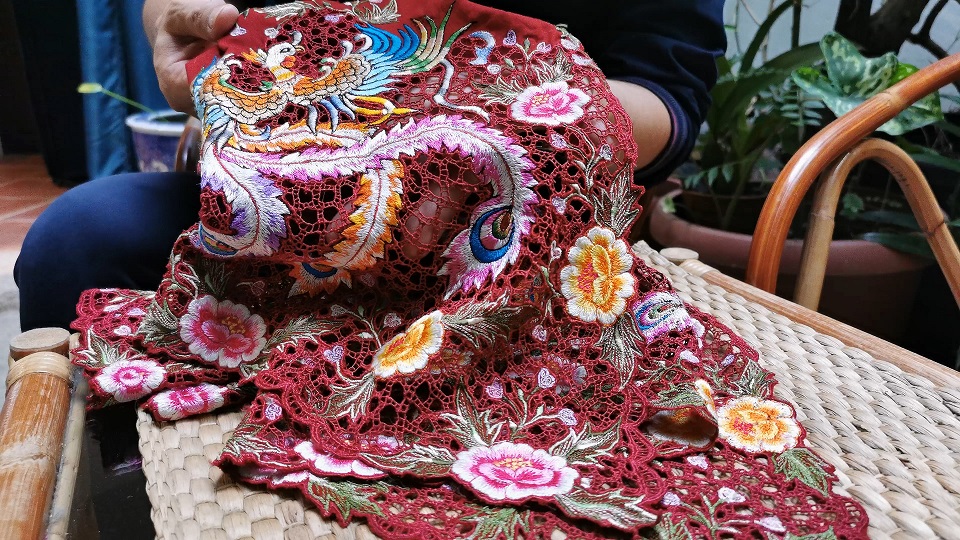
Kenny leaves no stone unturned when it comes to attention to detail.
“To make a good Kebaya, you need to start with great materials. I use Japanese cotton and thread imported from France,” says Kenny. “In the past, the embroidery is done separately on a different piece of fabric before it is brought to another craftsman to be fabricated into a kebaya. I have reversed the process and eliminated the need for a separate craftsman.” The result is astonishing.
Unlike traditional kebayas, Kenny’s are seamless at the sides, allowing for very delicate and intricate embroidery work that flows continuously from the front to the back. “Good embroidery is also double-sided. What you see in the front, you should also see at the reverse of the fabric,” Kenny explains.
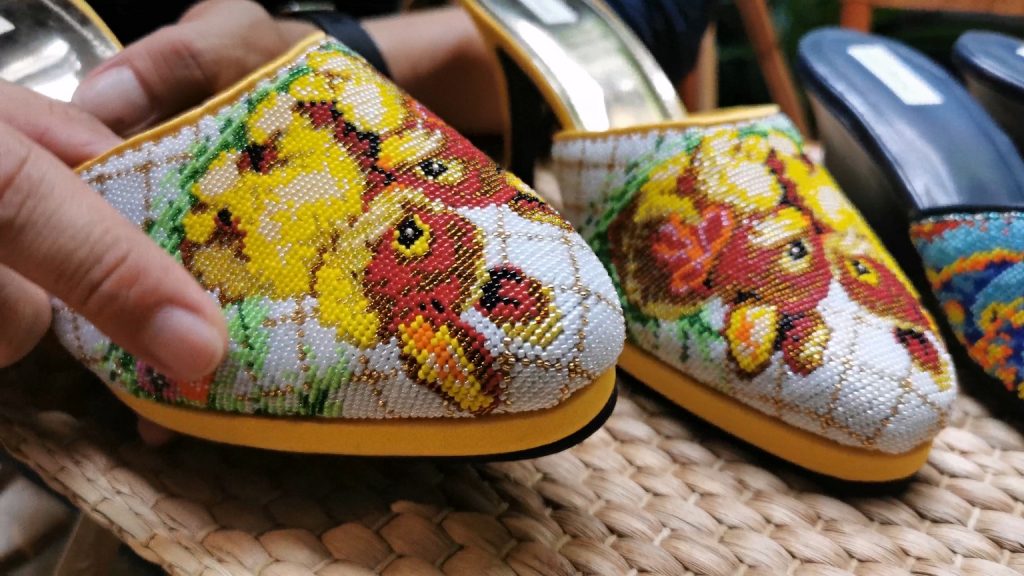
Quality beads from Japan retain their vibrancy in colour even after many years.
Kenny also makes beaded slippers to complete the Baba Nyonya look. And just like his philosophy for his kebaya tops, he has a very holistic approach. It always begins with having no compromises to materials. Kenny imports glass beads from Japan as poorer quality ones tend to fade in colour in a couple of years. He is also very particular about the threads that hold the beads to the face of the slipper. “Usually after a few years of being worn, the beads will begin to drop. You will never find that happening with mine. I use the best thread you can find,” articulates Kenny.
But what use is a pretty slipper if it is not practical? A good slipper looks beautiful, but a great one must also feel comfortable. Before releasing his designs, he painstakingly refines the make quality so that the slippers feel as good as they look.
Today, Kenny is likely the only individual that can perform a complete Baba Nyonya bespoke fitting from head to toe. In the past, various artisans and craftsmen must come together to perform this as no single person had the mastery to produce a complete outfit from scratch. This process often takes place in his shop in 34 Jalan Servis, Penang, where customers can discuss their design preferences and get their exact sizes measured and tweaked.
When asked about the various challenges he faces as an artist, Kenny says, “Even though we have a quality product, the market is very niche.” He continues with a sigh, “Young people normally do not wear kebaya or beaded slippers these days, likely because they do not know enough about it. I wish more organisations and art enthusiasts will take interest in promoting this craft.”
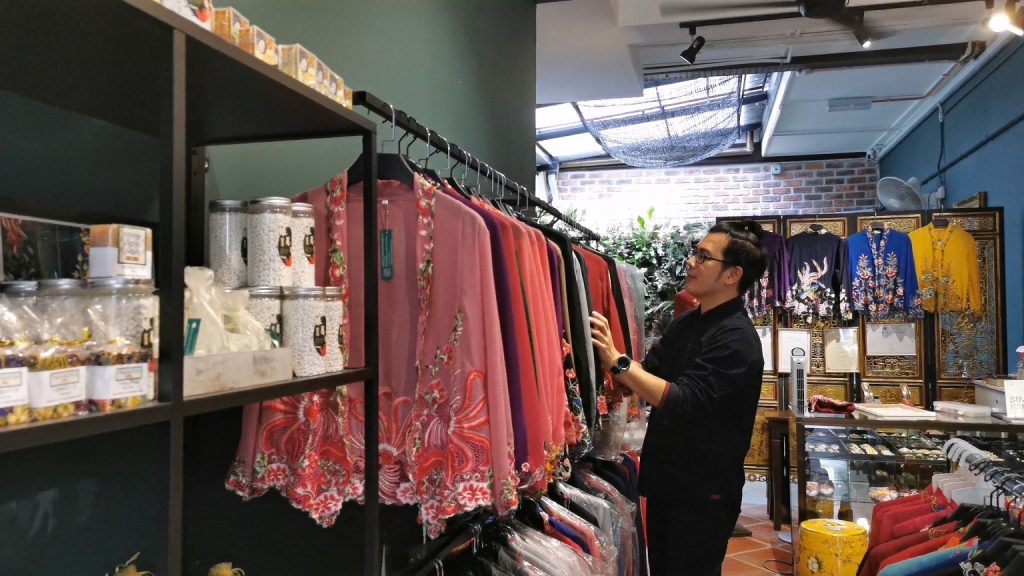
Patrons can choose from ready-made kebayas or bespoke ones.
But Kenny is not without aspirations. He has recently just set up a website with step-by-step ordering guides to ease engagements as many people today prefer to browse virtually amid the Covid crisis. If needed, he can still be contacted personally to discuss the piece.
“Hopefully when things get better, I can involve myself with high profile events like fashion shows and cultural events. People need to know about our unique culture and products. We need to reach them,” says Kenny with a glint of optimism in his eyes.
You can tell. Kenny is confident with his craft and he loves Penang very much when you hear him speak about it. “There is a certain charm about this place and her people that you can never find anywhere else. We must be proud of it.”
Kenny Loh Couture
34, Jalan Service
10050 George Town
Penang, Malaysia
Cover image courtesy of Kenny Loh
A man of many talents, Kelvyn Yeang is a content creator, musician and more. Nothing inspires him more than the city, people of Georgetown and a good cup of coffee.

